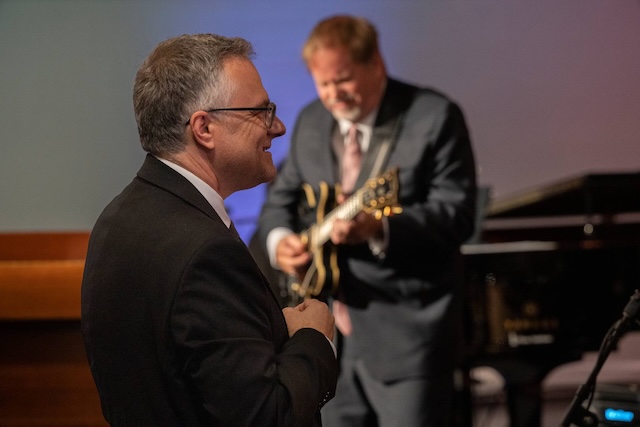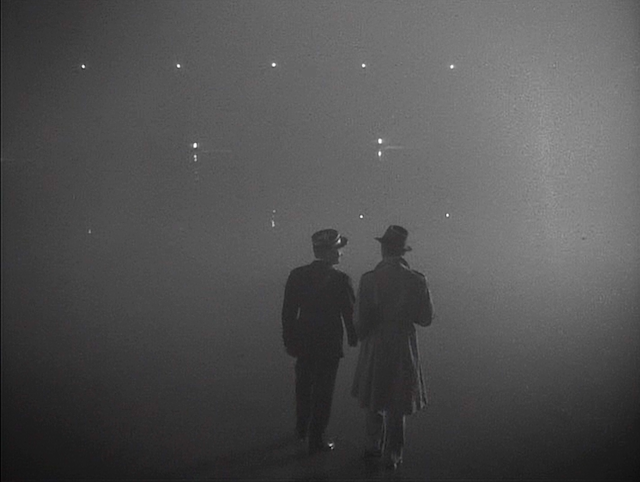
Dave Stryker, on guitar, is an adjunct lecturer in jazz guitar at the Indiana University Jacobs School of Music. and Brent Wallarab, director of the Wes Montgomery Jazz Tribute that was recorded at WTIU Studios at IU Bloomington on Monday, Oct. 17, 2022. This event also launched the idea for Stryker with Strings Goes to the Movies. (Photo by Chris Howell/Indiana University)
By David McGee
STRYKER WITH STRINGS GOES TO THE MOVIES
Dave Stryker with Orchestra arranged and conducted by Brent Wallarab
Strikezone Records
It started inauspiciously in 2023, when Dave Stryker was invited by PBS to join in a 100th birthday tribute to Wes Montgomery, playing the Wes role with music arranged for big band and string orchestra by Brent Wallarab, long-time co-leader of the Buselli-Wallarab Jazz Orchestra.

The Making of Stryker with Strings Goes to the Movies
“It came off really well,” Dave recalls in a making-of-the-album video, “to the point where I said, ‘Brent, we should do a project together.’”
Brent: “So we were kind of batting around ideas; we knew we wanted to do something with my arrangements and Dave’s solo guitar and strings”
Dave: “So we started kicking around ideas.”
Brent: “I think it was Dave’s idea.”
Dave: “I said, ‘How about movie themes?’ He was like…’Yes!’”
Last year was a very good year for Dave Stryker. Early in 2024 he and his band (organist Jared Gold and drummer McClenty Hunter) released Groove Street in collaboration with the formidable tenor saxophonist Bob Mintzer, who contributed two original tunes to spice up the grooves and fell in with the Stryker band to such a degree that, as it said in these pages, “the communication between the players here is more like that of musicians that have played together for years, so sure is their sense of where the groove is leading them.” Later in 2024, Stryker, accompanied by Xavier Davis on piano and Rhodes, Jeremy Allen on acoustic and electric bass and McClenty Hunter solid as ever on drums, and further supplemented by a 30-piece studio orchestra featuring a 17-piece string section, all beautifully arranged and empathetically conducted by Wallarab.

Bernard Hermann’s ‘Taxi Driver,’ solo by Greg Ward, from Stryker with Strings Goes to the Movies
Stryker With Strings Goes to the. Movies is the fanciful title of this project and it gets off to an appropriately fanciful start with the Peter Gabriel tune, “In Your Eyes” (from Say Anything), minus the Youssou N’Dour vocal from the original but featuring violinist Sara Caswell in a spirited dialogue with Stryker, the robust tone and soothing texture of his hollow body electric playing a soothing but vivid counterpart to Caswell’s fiery soloing. In the Making of Stryker With Strings Goes to the Movies video, Wallarab mentions “In Your Eyes” being one of his wife’s favorite movies, and further points out Oscar winning Cinema Paradiso ranking as one of Stryker’s wife’s favorite movies. So from “In Your Eyes” the tunestack moves to Cinema Paradiso’s main theme, an occasion for a tender, romantic Stryker guitar solo leading the way, before the horns rumble in, the strings enter caressing a sweet melody, and Stryker continues exploring the melody line in spare, clean notes, leading to Xaxier Davis and McClenty Hunter picking up the pace before Stryker re-enters sustaining the tender groove before giving way to a lush, Mancini-like flourish of horns and strings.

Duke Ellington’s ‘Low Key Lightly,’ composed for Otto Preminger’s Anatomy of A Murder, with Sara Caswell on violin, from Stryker With Strings Goes to the Movies
This level of instrumental dialogue recurs throughout the album as it ranges over themes from movies from the mid-‘50s through the mid-‘70s. The oldest of these is Joshua Logan’s multi-Oscar-nominated 1956 romantic drama Picnic (with its “Moonglow and Theme from Picnic” single by Morris Stoloff and the Columbia Pictures Orchestra topping and remaining on the charts for 27 weeks) in a Wallarab arrangement that retains the lush strings and features a cool, discursive trombone solo by Jim Pugh to complement Stryker’s sensuous guitar. From one movie comes two tracks here, namely Otto Preminger’s finest hour in 1958’s Anatomy of a Murder, one of the greatest courtroom dramas in film history (it’s preserved in the Library of Congress’s National Film Registry). Apropos of this album, its soundtrack was composed by Duke Ellington and Billy Strayhorn and performed by Ellington’s orchestra, and two of those Ellington-Strayhorn tunes get the Stryker-Wallarab treatment: “Flirtibird,” with Stryker’s guitar slinky and moody, provides opportunity for Mark Buselli to ease in with a medium-cool flugelhorn ahead of Greg Ward adding a keening voice on alto sax; the moody and aptly titled “Low Key Lightly,” with Ms. Caswell adding a winsome touch to the violin solo first performed by Ray Nance on the soundtrack, setting up Stryker’s bluesy solo over horns ascending (listen for the clever, fleeting interpolations of the Gershwins’ “Our Love is Here to Stay” in this version). Bernard Hermann, one of cinema’s greatest composers, left a wealth of movie themes from which to choose, with his portentous theme for Martin Scorsese’s 1976 classic, Taxi Driver, conjuring the original’s doom-laden construction in Wallarab’s brass and strings arrangement, with dark atmospherics swirling overhead in the form of Greg Ward’s sax solo framing Stryker’s mordant guitar solos all leading to a fresh wrinkle in a closing, spare dialogue between the Rhodes keys and Stryker’s guitar.

Henry Mancini’s ‘Dreamsville,’ composed for Blake Edwards’ Peter Gunn TV show and reprised in his 1967 film Gunn, from Stryker with Strings Goes to the Movies
A funky workout on Isaac Hayes’s “Theme from Shaft”; a luxurious setting of “You Only Live Twice” with soaring strings, sumptuous waves of horns, and frisky, melodic solos courtesy Stryker and Xavier Davis (a nice, fanciful run around the melody); a suitably measured interpretation of British composer Stanley Myers’s “Cavatina,” from The Deer Hunter (1978), is graced by Stryker’s tender nylon string guitar reflections, swelling strings, warm horns and a surprising jazz-waltz uprising amidst it all; and for a delightful closer, the Stryker quartet takes a leisurely stroll through Rodgers and Hammerstein’s Sound of Music classic, “Edelweiss,” keeping the catchy melody front and center while fashioning hummable variations on the familiar theme.
The mutual admiration society that is Dave Stryker and Brent Wallarab has much to crow about in this memorable collaboration. In David Brent Johnson’s liner notes, Stryker lauds Wallarab for making the project “cinematic,” and adds: “He’s such a great arranger and musician. Because of him, we came up with something really special.” Wallarab returns the compliment, hailing Stryker as “one of the most swinging guitarists alive,” and extolling the guitarist’s sense of the song: “It’s his innate understanding of how to serve, through subtle nuance, each individual tune that is amazing. Every melody statement and improvised solo is perfectly shaped for the song, and for the arrangement. His solos start, arc, and conclude as a perfect part of the composition, and he gets it right every time.”
In their appraisals of each other’s strengths, both artists are on the money. This could be the start of a beautiful friendship.


